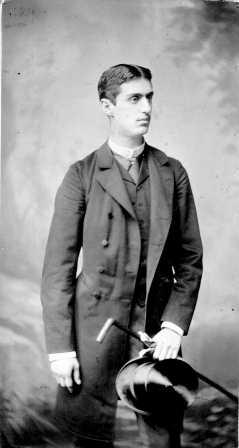 Theodor Herzl was born in 1860 to a wealthy Jewish family in Budapest. He was raised in the spirit of the enlightenment, and his education was seasoned with a moderate amount of Jewish tradition, as was the custom with upper class Jewish European families at the time. In 1878, after the sudden death of his sister Paulina, the Herzl family moved to Vienna, where Theodor began studying law. In 1884 he began practicing law, but after a year decided that his calling lay elsewhere.
Theodor Herzl was born in 1860 to a wealthy Jewish family in Budapest. He was raised in the spirit of the enlightenment, and his education was seasoned with a moderate amount of Jewish tradition, as was the custom with upper class Jewish European families at the time. In 1878, after the sudden death of his sister Paulina, the Herzl family moved to Vienna, where Theodor began studying law. In 1884 he began practicing law, but after a year decided that his calling lay elsewhere.
In 1885 Herzl began writing and working as a journalist. So began his journey towards Zionism. In 1891 he took a job with the Viennese daily Neue Freie Presse. During his work as a reporter, he was exposed to anti-semitic trends in European society, and this experience left a deep mark on him. During this time in his life he came to an understanding that the "Jewish problem" demanded a radical solution. This inner process peaked during the Dreyfus Affair of 1894, which Herzl covered for his newspaper. The Affair instigated unprecedented public animosity towards the Jews. The derogatory accusations haunted him relentlessly, and the experience led him to develop a new approach to Zionism.
The book "Der Judenstaat" (The Jewish State) was published in 1896. It is the fruit of the metamorphosis of Herzl's convictions .From originally believing in Jewish integration into European society, he later became convinced of the urgent necessity for the founding of a Jewish state. With its introduction of the Zionist vision, the book caused a storm within European Jewry. The response was split within the socio-economic classes. While it was enthusiastically embraced by the lower class, the upper class mostly rejected it.

A year after The Jewish State was published, the First Zionist Congress was held in Basel. In the following years Herzl strove to achieve diplomatic recognition of his ideas, a recognition he perceived as the basis for his vision.
Herzl's path was paved with hardships - one of the most notable ones was the Uganda crisis that caused a rift in the Zionist movement. Herzl did not get to see his vision come true, and towards the end of his life he began to doubt the ability of his ideas to turn into reality. But despite its difficult birth, the Zionist vision that came into being in the mind of one young journalist from Vienna, was realized years after his death, in the spirit of the saying "Nothing can stand in the way of an idea whose time has come."